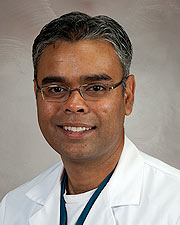Biography
Dr. Doshi did a combined emergency medicine and internal medicine residency at Henry Ford Hospital in Detroit, where he also did a critical care fellowship. After becoming board-certified in multiple disciplines, he joined McGovern Medical School faculty. He splits his time between critical care medicine in various intensive care units and does clinical shifts in the emergency department. He is the director for the McGovern Medical School’s Physical Diagnosis course.
He is an integral part of the emergency medicine residency, having developed an ongoing critical care lecture series for the residents’ conference, an elective EM rotation in critical care which he supervises, and the development of an online critical care reference article set. He is a member of the EM Quality Assurance committee and the EM Residency Education Committee. He has received numerous teaching awards and is actively engaged in medical student and resident education in all the clinical environments within which he works.
Education
- MD
- UMDNJ
- Internship
- EM/IM Combined, Henry Ford Hospital
- Residency
- EM/IM Combined, Henry Ford Hospital
- Fellowship
- Critical Care, Henry Ford Hospital
Areas of Interest
Clinical Interests
Quality Improvement – error recognition and reduction; Patient flow issues from emergency department to critical care unit; Emergency medicine-critical care faculty interface and relations
Research Interests
Post-cardiac-arrest care; Sepsis management; Neurologic emergencies; Resuscitation
Dr. Doshi’s research interest is focused on optimization of management of critically ill patients in the emergency department and the intensive care unit. His past projects include “Prospective Randomized trial of Insulin Glargine in Acute Management of Diabetic ketoacidosis in the Emergency Department: A Pilot Study” and “Safety and Efficacy of tPA in acute ischemic stroke patients requiring aggressive blood pressure control”. His research interest are broad and include the resuscitation of patients with post-cardiac arrest syndrome and septic shock, as well as quality improvement science focused on improved care of the critically ill patients in the emergency department.
